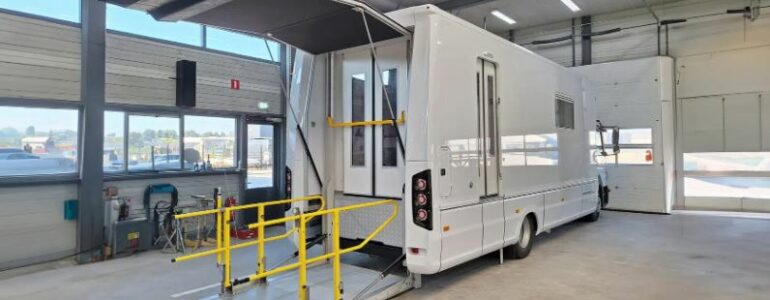31/07/24

In the dynamic world of automotive manufacturing, the ability to produce custom components quickly and cost-effectively is a game-changer. Van Venrooy Utility Vehicles, a forward-thinking company specialized in custom-made vans and vehicles for various sectors such as healthcare, motorsports, information, and recreation, has decided to integrate Caracol’s advanced large scale 3D printing robotic platform Heron AM in its production workflow. With the aim of redesigning its supply chain and internalizing the production of several components, Van Venrooy has achieved remarkable improvements in efficiency and flexibility, for the production of custom vans.
Van Venrooy needed a solution to produce bespoke body parts for their dental vans, which operate as mobile dental services across the Netherlands. Traditional manufacturing methods proved inefficient, involving complex, fragmented supply chains and long lead times. The need for high precision and customizability further complicated the process, resulting in high costs and uncertainty in parts availability.
Caracol’s application engineering team shared its Design for Large Format Additive Manufacturing expertise and application-first approach to support Van Venrooy in designing and manufacturing custom body parts for their vans. The project focused on optimizing the design of volumes and surfaces to ensure the best fit for assembly and the required parts’ accuracy.
Using the Heron AM 300 platform equipped with Caracol’s High Accuracy extruder, several end-use parts were produced with Dahltram® S-150CF (carbon-fiber-reinforced ABS material). This setup was ideal for creating detailed, smooth surfaces and accurate geometries, essential for functional and aesthetic purposes.
Design and Engineering: Caracol’s team worked closely with Van Venrooy to design custom parts that met all functional and aesthetic requirements. This set emphasized creating parts that could handle operating loads and fit perfectly upon assembly onto the finished vans.
3D Printing: The Heron AM 300 platform facilitated the production of parts with extreme design flexibility. Caracol’s technology ensured high precision and smooth finishing, streamlining post-processing steps such as sanding and painting.
Post-Processing: The post-processing phase involved sanding and painting. Indeed, a combination of key, technical elements led to greater tolerances and finishing quality:
Van Venrooy tested Caracol’s technology with an initial project at Caracol’s On-Demand Manufacturing plant. The results showcased significant cost and time optimization, waste reduction, and superior quality. Encouraged by these outcomes, Van Venrooy decided to internalize LFAM Heron AM platform within their own plant to scale the production of custom-made cars.
The first series of 3D printed components included exterior, end-use parts such as rear bumpers, camper hatches, fenders, and taillight covers. These components were integral to the functionality and aesthetics of the mobile dental vans that were being manufactured.
The main benefits achieved in terms of efficiency, are:
Shorter Lead Times: The 3D printing process dramatically reduced production times, with parts being ready to use in just 5 days—a reduction of 85% compared to traditional methods.
Localized Supply Chain: By adopting a localized supply chain, Van Venrooy eliminated long-distance shipments and uncertainty in parts availability. The Heron AM platform enabled them to have bespoke parts and small series on-demand right at the point of use, significantly enhancing production flexibility and positively impacting on the overall environmental footprint of the company’s production process.
Cost Savings: The new manufacturing process led to drastic cost reductions. The efficiency of 3D printing, combined with a streamlined supply chain, resulted in smoother manufacturing processes without compromising quality or accuracy.
The collaboration between Van Venrooy and Caracol AM, and the adoption of the Heron AM platform, is supporting the company’s transformation of their production process, showing how it is possible to leverage 3D printing technologies to effectively manufacture finished parts for advanced sectors, such as the automotive industry. By reshaping their supply chain and embracing innovative manufacturing techniques, Van Venrooy is setting new standard for efficiency, flexibility, and quality in custom automotive part production.
This success story highlights the potential for other manufacturers to explore 3D printing as a viable solution for modern production challenges, unlocking new possibilities to produce small series of interior and exterior end-use components of custom utility vehicles and leisure vans.